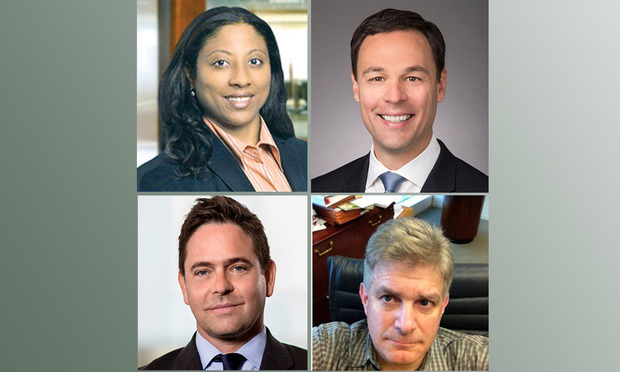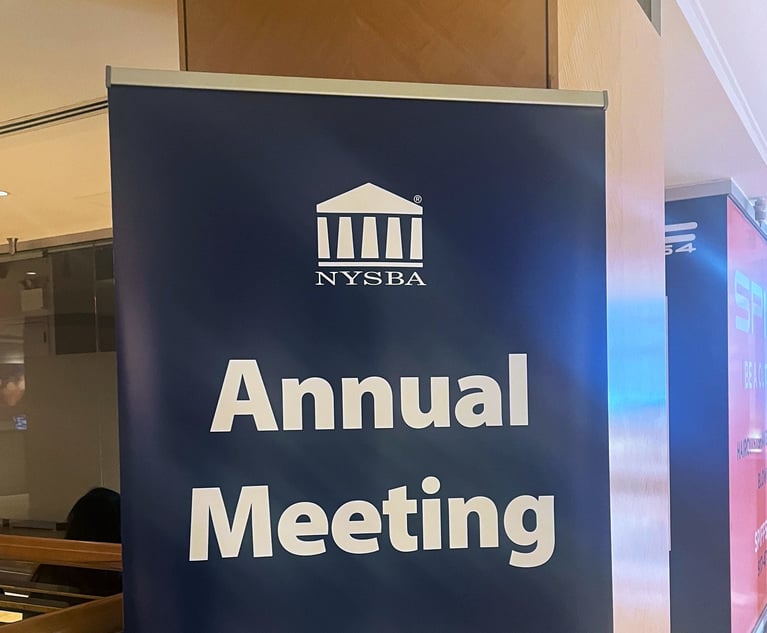Convictions Roil Big Law Firms as Partners Seek 'The Good Life'
It's been a year of high-profile prosecutions and convictions involving partners at prestigious firms. What keeps leading lawyers astray?
November 27, 2017 at 06:30 AM
5 minute read

In the last year, the legal industry has seen a rash of ex-partners from large and prestigious law firms earn convictions for a range of serious felonies. Others are fighting the charges after pleading not guilty.
Several top criminal defense attorneys acknowledged 2017 has been a year filled with notable Big Law partner convictions. But they said it's probably not because the profession is any more dishonest than it was, nor due to a sharpened focus by law enforcement on attorneys in the last few years. They pointed to a string of lawyer scandals in previous decades, from tax shelter charges to insider trading schemes.
Rather, several defense lawyers said there is an increasing awareness and greater media coverage of such attorney cases now, leading to higher exposure and fallout for the partners and their law firms.
“There is more sunshine,” said Robert Anello, a partner at criminal defense firm Morvillo Abramowitz Grand Iason & Anello. “Lawyers have become more interesting to the public in general, so these cases get highlighted more.”
Whether or not there are more of them, the cases tend to share some characteristics. While the charges vary, many of the ex-partners convicted this year were accused of taking advantage of their legal practice, either by accessing and using confidential information or using the power associated with their law practice to bilk unsuspecting victims.
Former Willkie Farr & Gallagher partner Keila Ravelo pleaded guilty on Nov. 20 to using bogus litigation support companies to obtain millions of dollars from Willkie and her prior firm, Hunton & Williams—money that went toward personal expenses and a luxurious lifestyle.
Jeffrey Wertkin, a former Akin Gump Strauss Hauer & Feld partner, has been accused of trying to sell two confidential whistleblower complaints. He plans to plead guilty, his lead defense lawyer told ALM earlier this month.
At least two recent cases against Big Law partners stemmed from insider trading schemes.
Former Arent Fox partner Robert Schulman was convicted in March on charges that he passed on an insider trading tip to an investment adviser.
Walter “Chet” Little, a former Foley & Lardner partner arrested on insider trading charges after he left that firm, was accused of using his position at Foley & Lardner to access confidential information for personal gain. He admitted to conspiracy to commit securities fraud in Manhattan federal court this month.
In other cases this year, attorneys have been charged with conspiring with their clients to commit crimes and have not been convicted. For instance, prosecutors allege Evan Greebel, a former partner at Kaye Scholer and Katten Muchin Rosenman, agreed to help Martin Shkreli, the convicted former CEO of Retrophin Inc., steal money. Greebel, who has pleaded not guilty, started trial last month in Brooklyn federal court.
“I started practicing in 1980 and I was shocked by how many clients were lawyers,” said Anello, noting that behind securities professionals, lawyers are his most frequent clients.
Many insider trading scandals have begun with large law firms, he said, such as the so-called Yuppie 5 insider scandal in 1986, which was tied to a former associate at Paul, Weiss, Rifkind, Wharton & Garrison. “The top firms in this city have had lawyers commit crimes, everything from misusing client assets, to tax evasion and insider trading,” Anello said.
And now, “there are so many more lawyers at large firms than there used to be,” Anello said, seemingly raising the likelihood of a convicted lawyer hailing from a big, established law firm.
Isabelle Kirshner, a partner at 11-attorney Clayman & Rosenberg, pointed out that access to valuable confidential information about mergers and acquisitions is more prevalent at large firms that handle big-ticket deals, while large firms also frequently spend millions of dollars on litigation support with vendors.
“Most smaller firms are not dealing with massive multidistrict litigation where you have the opportunity to hide an extra half-million in dollars in fees to a vendor,” Kirshner said. “My clients would notice if I put half a million in fees to a vendor.”
Another frequent focus of prosecutions against lawyers relates to tax shelter schemes, with past cases famously ensnaring former Jenkens & Gilchrist partners Paul Daugerdas and Donna Guerin in the last decade and Raymond Ruble, once a partner at Brown & Wood, in 2008.
The tax shelter theme continued in 2017. Harold Levine, the former chair of the tax practice group at Herrick Feinstein, and a co-defendant pleaded guilty to charges that they failed to report collectively more than $4 million in income to the IRS. According to federal prosecutors and court records, the pair evaded taxes from millions in fees from tax shelters and other related transactions received from Levine's work while at Herrick Feinstein.
The motivation for many of the partners facing prosecution seems to boil down to one word: greed. Or maybe greed combined with envy for their wealthy clients, Anello suggests.
“They see their clients making the good life,” Anello said, “and they want the good life.”
As competition in the legal industry becomes stiffer, others may be trying to protect what they already have.
They see their career fading, and “want out of desperation to do something to supplement their income,” Anello said. “They live high on the hog and need money to do it.”
This content has been archived. It is available through our partners, LexisNexis® and Bloomberg Law.
To view this content, please continue to their sites.
Not a Lexis Subscriber?
Subscribe Now
Not a Bloomberg Law Subscriber?
Subscribe Now
NOT FOR REPRINT
© 2025 ALM Global, LLC, All Rights Reserved. Request academic re-use from www.copyright.com. All other uses, submit a request to [email protected]. For more information visit Asset & Logo Licensing.
You Might Like
View All
Blake Lively’s Case Highlights How Pre-Litigation Subpoenas Can Expose Harassment in Hollywood
5 minute read


NYSBA Annual Meeting: How In-House Counsel Navigate Gen AI Risk
Trending Stories
- 112-Partner Team 'Surprises' Atlanta Firm’s Leaders With Exit to Launch New Reed Smith Office
- 2Amex Latest Target as Regulators Scrutinize Whether Credit Card Issuers Deliver on Rewards Promises
- 3Vedder Price Shareholder Javier Lopez Appointed to Miami Planning, Zoning & Appeals Board
- 4Wells Fargo and Bank of America Agree to Pay Combined $60 Million to Settle SEC Probe
- 5Legaltech Rundown: Robin AI Releases In-house Tool, Epona Merges With JustiSolutions, and More
Who Got The Work
J. Brugh Lower of Gibbons has entered an appearance for industrial equipment supplier Devco Corporation in a pending trademark infringement lawsuit. The suit, accusing the defendant of selling knock-off Graco products, was filed Dec. 18 in New Jersey District Court by Rivkin Radler on behalf of Graco Inc. and Graco Minnesota. The case, assigned to U.S. District Judge Zahid N. Quraishi, is 3:24-cv-11294, Graco Inc. et al v. Devco Corporation.
Who Got The Work
Rebecca Maller-Stein and Kent A. Yalowitz of Arnold & Porter Kaye Scholer have entered their appearances for Hanaco Venture Capital and its executives, Lior Prosor and David Frankel, in a pending securities lawsuit. The action, filed on Dec. 24 in New York Southern District Court by Zell, Aron & Co. on behalf of Goldeneye Advisors, accuses the defendants of negligently and fraudulently managing the plaintiff's $1 million investment. The case, assigned to U.S. District Judge Vernon S. Broderick, is 1:24-cv-09918, Goldeneye Advisors, LLC v. Hanaco Venture Capital, Ltd. et al.
Who Got The Work
Attorneys from A&O Shearman has stepped in as defense counsel for Toronto-Dominion Bank and other defendants in a pending securities class action. The suit, filed Dec. 11 in New York Southern District Court by Bleichmar Fonti & Auld, accuses the defendants of concealing the bank's 'pervasive' deficiencies in regards to its compliance with the Bank Secrecy Act and the quality of its anti-money laundering controls. The case, assigned to U.S. District Judge Arun Subramanian, is 1:24-cv-09445, Gonzalez v. The Toronto-Dominion Bank et al.
Who Got The Work
Crown Castle International, a Pennsylvania company providing shared communications infrastructure, has turned to Luke D. Wolf of Gordon Rees Scully Mansukhani to fend off a pending breach-of-contract lawsuit. The court action, filed Nov. 25 in Michigan Eastern District Court by Hooper Hathaway PC on behalf of The Town Residences LLC, accuses Crown Castle of failing to transfer approximately $30,000 in utility payments from T-Mobile in breach of a roof-top lease and assignment agreement. The case, assigned to U.S. District Judge Susan K. Declercq, is 2:24-cv-13131, The Town Residences LLC v. T-Mobile US, Inc. et al.
Who Got The Work
Wilfred P. Coronato and Daniel M. Schwartz of McCarter & English have stepped in as defense counsel to Electrolux Home Products Inc. in a pending product liability lawsuit. The court action, filed Nov. 26 in New York Eastern District Court by Poulos Lopiccolo PC and Nagel Rice LLP on behalf of David Stern, alleges that the defendant's refrigerators’ drawers and shelving repeatedly break and fall apart within months after purchase. The case, assigned to U.S. District Judge Joan M. Azrack, is 2:24-cv-08204, Stern v. Electrolux Home Products, Inc.
Featured Firms
Law Offices of Gary Martin Hays & Associates, P.C.
(470) 294-1674
Law Offices of Mark E. Salomone
(857) 444-6468
Smith & Hassler
(713) 739-1250






